The Intel Core i3-7350K (60W) Review: Almost a Core i7-2600K
by Ian Cutress on February 3, 2017 8:00 AM ESTLegacy and Synthetic Tests
At AnandTech, I’ve taken somewhat of a dim view to pure synthetic tests, as they fail to be relatable. Nonetheless, our benchmark database spans to a time when that is all we had! We take a few of these tests for a pin with the latest hardware.
Cinebench R10
The R10 version of Cinebench is one of our oldest benchmarks, with data going back more than a few generations. The benchmark is similar to that of the newest R15 version, albeit with a simpler render target and a different strategy for multithreading.
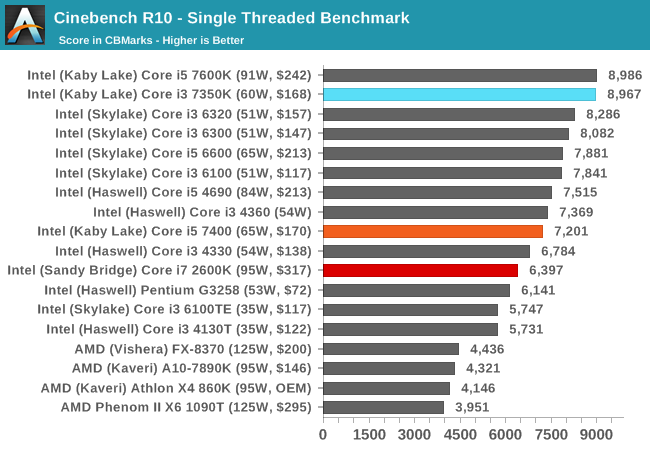
With high frequency in tow, the Core i3-7350K makes its mark.
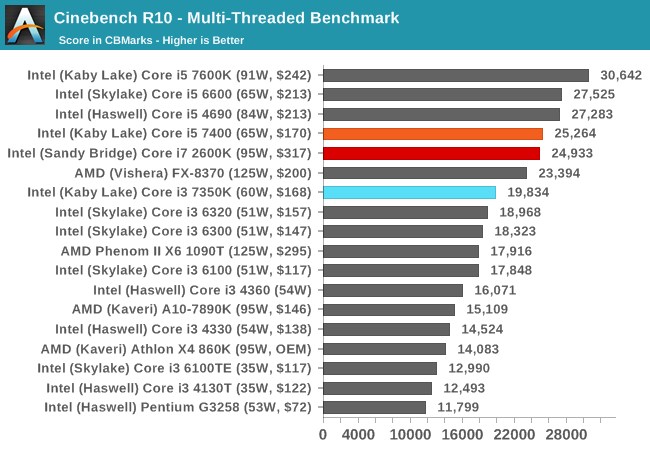
When more threads come to play, the Core i5-7400 and Core i7-2600K battle it out in terms of four cores and IPC vs hyperthreading. The Core i3-7350K sits around ~25% behind.
Cinebench R11.5
CB11.5 has been popular for many years as a performance test, using easy to read and compare numbers that aren’t in the 1000s. We run the benchmark in an automated fashion three times in single-thread and multi-thread mode and take the average of the results.
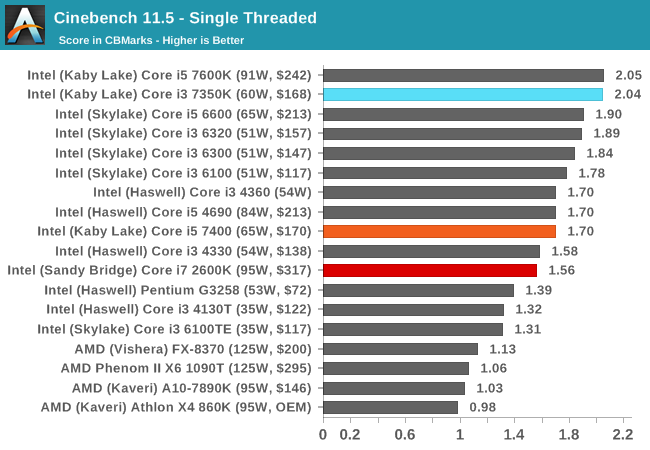
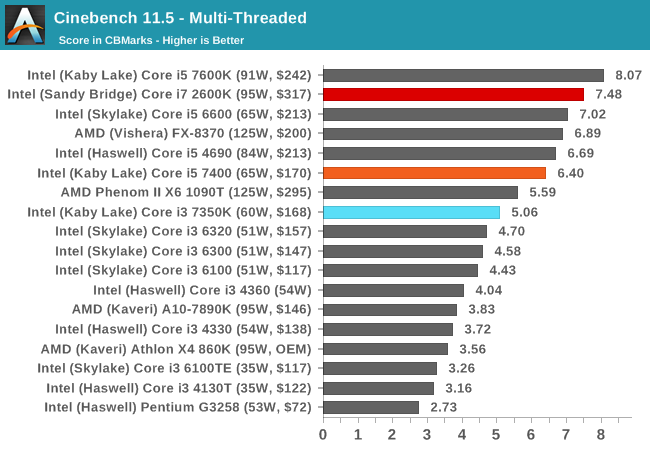
Similar to CB10, the single thread results show that a 4.2 GHz Kaby Lake is nothing to be sniffed at. In the multithreaded test, CB11.5 is more able to leverage the hyperthreads, showing that a Core i7-2600K will run rings around the low end Kaby i5, but is bested by the higher frequency Kaby i5-K. The Core i3 still has that dual core deficit.
7-zip
As an open source compression/decompression tool, 7-zip is easy to test and features a built-in benchmark to measure performance. As a utility, similar to WinRAR, high thread counts, frequency and UPC typically win the day here.
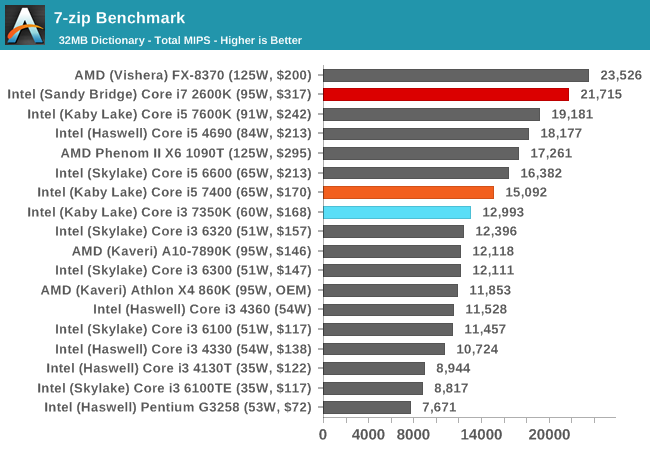
The difference between the i3-7350K and the i5-7400 shows that 7-zip prefers cores over threads, but the Core i7-2600K results show it can use both to good effect, even on older microarchitectures, scoring almost double the i3-7350K.
POV-Ray
Ray-tracing is a typical multithreaded test, with each ray being a potential thread in its own right ensuring that a workload can scale in complexity easily. This lends itself to cores, frequency and IPC: the more, the better.
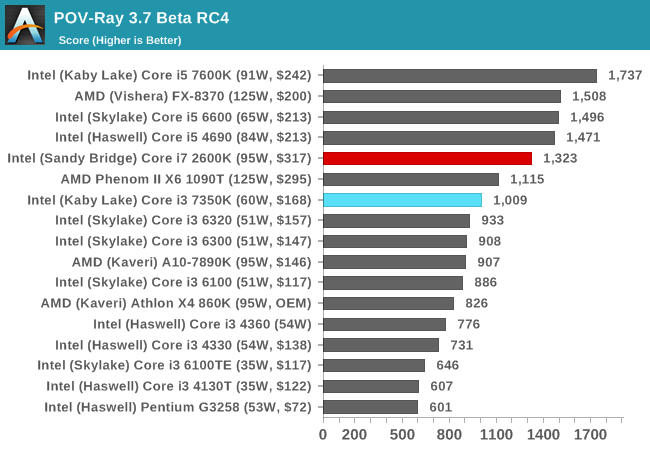
POV-Ray is a benchmark that is usually touted as liking high IPC, high frequency and more threads. The i7-2600K, despite having double the resources of the Core i3-7350K, is only 30% ahead.
AES via TrueCrypt
Despite TrueCrypt no longer being maintained, the final version incorporates a good test to measure different encryption methodologies as well as encryption combinations. When TrueCrypt was in full swing, the introduction of AES accelerated hardware dialed the performance up a notch, however most of the processors (save the Pentiums/Celerons) now support this and get good speed. The built-in TrueCrypt test does a mass encryption on in-memory data, giving results in GB/s.
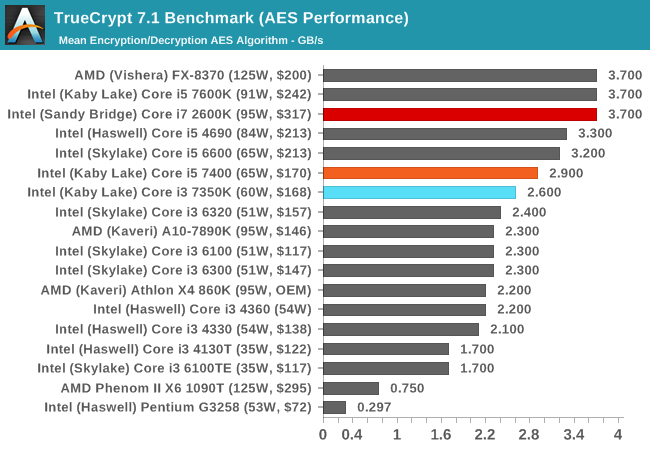










186 Comments
View All Comments
blzd - Friday, February 10, 2017 - link
You may need to test with some newer games, some of which I read are having issues running with dual cores.Minimum FPS might be worth including as well.
Narg - Friday, February 10, 2017 - link
I couldn't help remember the old Celerons from years past that could be overclocked to the point of more than double the performance of chips barely twice their price from Intel. This is nothing new. And glad to see Intel has really not lost their "geeky" mindset for the true hardware hardcore among us.albert89 - Friday, February 17, 2017 - link
You can run the i7-2600K on Win8.1 and down. You can't do that with the i3-7350.TheJian - Wednesday, February 22, 2017 - link
They testing the i3-7350 w/Z270 here and used the on chip gpu with Win7 x64. It would appear Wintel lied about Z270+Kaby lake not working with Win7? What driver is Ian Cutress using here for the integrated gpu testing? Please clear this up Ian.Wish they had used a 1080 gtx.
Vatharian - Friday, March 3, 2017 - link
I'd be hardly pressed to change 2600K (which I had) to 2C/4T CPU. But then, I was blessed with a God's chip: my 2600K easily and comfortably reached 5.2 GHz at ~1.38 V. I really don't believe 7350K would catch up with THIS.BTW, anyone doing even just a little bit of coding on their PC would welcome compilation benchmark!
Artanis2 - Friday, June 9, 2017 - link
Still to comeCalculating Generational IPC Changes from Sandy Bridge to Kaby Lake
Intel Core i7-7700K, i5-7600K and i3-7350K Overclocking: Hitting 5.0 GHz on AIR
Intel Launches 200-Series Chipset Breakdown: Z270, H270, B250, Q250, C232
Intel Z270 Motherboard Preview: A Quick Look at 80+ Motherboards
WHEN ?!